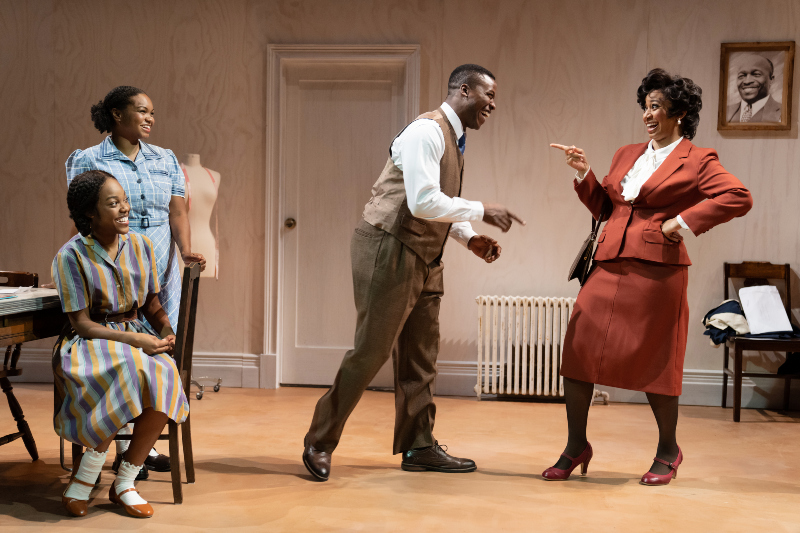Crumbs from the Table of Joy
By Lynn Nottage; Directed by Colette Robert
Produced by Keen Company
Off Broadway, Play Revival
Runs through 4.1.23
Theatre Row, 410 West 42nd Street
by Shani R. Friedman on 3.28.23
 (L-R): Shanel Bailey, Malika Samuel, Jason Bowen, and Sharina Martin in Crumbs from the Table of Joy. Photo by Julieta Cervantes.
(L-R): Shanel Bailey, Malika Samuel, Jason Bowen, and Sharina Martin in Crumbs from the Table of Joy. Photo by Julieta Cervantes.
BOTTOM LINE: In this solid but limited 1950s-set family drama, there’s early promise of the Pulitzer Prize-winning writing to come from playwright Lynn Nottage.
I’ve been fortunate now to see three of Lynn Nottage’s plays: there was Ruined and Sweat (both won the Pulitzer, making her the only woman to win the Pulitzer Prize for Drama twice), and now this first NY revival of Crumbs from the Table of Joy. This 1995 play is a portrait of a grieving Florida widower who, trying to leave both his memories and the Jim Crow South behind, has brought his daughters north to desegregated Brooklyn (where Nottage was born), off the A train to Nostrand Avenue.
Godfrey Crump (Jason Bowen) is lost and unmoored in the wake of his wife Sandra’s recent death and seeks salvation in all forms from radio evangelist Father Divine, to whom he composes many questions about his life, spirituality, and two teenage daughters. Father Divine’s portrait presides over their spare basement apartment, the only other prized possession the radio Sandra had won in a contest (set by Brendan Gonzales Boston).
Of his daughters, 15-year-old Ermina (Malika Samuel) is the less serious: she’s been left back a year, is a little boy crazy, and ready to fight the girls at school who tease them about the homemade outfits their mother had sewn. 17-year-old Ernestine (Shanel Bailey), or Ernie, as her sister calls her, is a huge movie buff who likes to rewrite moments from her life as film scenes. It’s a notable and wondrous event when she goes to the cinema “right smack between two white gals. Oh, Yes!” Ernie likes the idea of being a Hollywood actress but with a French name, and assures listeners that onscreen she “can act very white.” Clearly, Ernie is reaching for something bigger and better. In a few months, she’ll be the first in the family to graduate from high school, and tenderly fusses over the white dress she is sewing for that day.
In placing her characters just a few years after the end of World War II, Nottage explores how both race relations and McCarthyism define their daily lives, no less in New York City. Godfrey works as a baker, putting up with the taunts and epithets of his boss and the limitations of his aspirations. He wears and maintains a beautiful pair of shoes—on the advice of the Divine Father—in which he stands all day, grasping for hope and trying to hold onto both his fiercely held faith and his sobriety.
Sandra’s sister Lily (Sharina Martin), who had long before decamped from Florida to Harlem, arrives on their doorstep speaking of revolutions. For Lily, the Communists are the only party that truly speaks for Blacks. Though contemptuous of Father Divine and Godfrey’s devotion, Lily has her own talisman of success—a beautiful red suit (one of the great period costumes from Johanna Pan) that, at least according to her, makes white women take note. When Lily moves herself in (her reason—that the girls need a female presence—may not be the whole truth), tensions within the family start to increase. The foursome cracks further after Godfrey returns one day with Gerte (Natalia Payne), a German refugee he meets on the subway, who is also searching for safety, security, and a home.
The five-person ensemble is great. Bailey and Samuel, though young adults, nicely capture the teenage emotions of the two girls, especially in a household full of its own turbulence. Bailey, as the narrator of both her family’s story and her own, skillfully portrays Ernie’s innocence; her wise-beyond-her-years asides show her budding cynicism and independence. Bowen, Martin, and Payne are terrific at expressing the abundant anguish, fury, and survival instincts of the three adults, and Payne has a wonderful interlude where she morphs into Marlene Dietrich.
Especially in comparison to Nottage's later work, Crumbs from the Table of Joy lacks dramatic weight; while there are glimmers of resonance beyond the confines of the Crump home, this isn't as readily apparent as what a play like Ruined or Sweat provides. But there is still value in seeing it. For one, it’s an opportunity to see something that hasn’t been done in New York in almost 30 years, and by the always first-rate Keen Company. And for those familiar with Nottage's later work (she also wrote Intimate Apparel, By the Way, Meet Vera Stark, and last season's Clyde's), this production offers a fascinating look into how a playwright introduces themes she will continue to come back to throughout her lauded career.
(Crumbs from the Table of Joy plays at Theatre Row's Theatre Five, 410 West 42nd Street, through April 1, 2023. The running time is 2 hours with an intermission. Performances are Tuesdays through Fridays at 7; Saturdays at 2 and 7; and Sundays at 2. There is an additional performance Fri 3/31 at 2. Tickets are $60 - $85. For tickets and more information visit keencompany.org.)
Crumbs from The Table Of Joy is by Lynn Nottage. Directed by Colette Robert. Set Design by Brendan Gonzales Boston. Costume Design by Johanna Pan. Lighting Design by Anshuman Bhatia. Sound Design by Broken Chord. Wig Design by Nikiya Mathis. Prop Design by Caitlyn Murphy. Vocal and Dialect Coach is Amanda Quaid. Fight and Intimacy Direction by Rocío Mendez. Stage Manager is Shane Schnetzler.
The cast is Shanel Bailey, Jason Bowen, Sharina Martin, Natalia Payne, and Malika Samuel.

